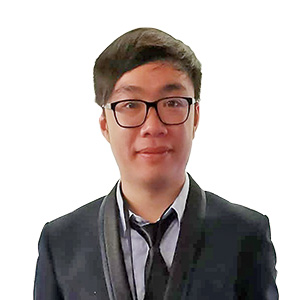When I was back in Malaysia I
never once considered coming to
Hong Kong. That's the truth. I got
offers from top universities around
the globe and was looking to study
in the US or Europe. But then one
of my friends at CityU told me
about the Computational Finance
programme. I saw what it covered,
found that it was really well-structured,
and decided to go for
it. I am glad I made one of the best
decisions in my life.
Computational Finance offers a
focused approach to study. In most
other universities in the US and
Europe, in the first and second years
you study the liberal arts. That's good
in so far as it exposes you to a lot
of new influences. But if you really
know what you want to do, a more
direct approach may suit you better.
Gaining a competitive
advantage
I find the Computational Finance programme to be very well-structured.
It covers finance,
statistics, and maths, but it doesn't
just skim the surface, it goes into
detail. It has helped me in all sorts
of ways: improve my knowledge
on financial products, learn how to
price, learn how to think logically
when making financial decisions.
Ironically, you usually only get
exposure to this sort of information
when you get into the industry. So
that's why I think I was pretty lucky to get into this Computational
Finance major where they teach
you all sorts of applied statistical
financial skills in advance. It's a
competitive advantage.
Professor Tao Li pitches his
coursework at a high level. He
teaches on pricing financial
products, and you can't find this
information even in the industry
itself because there's no definitive
guide to follow. But what Professor
Li has done, is accumulate all of
his experience, and come up with
a guide written from his own
perspective. He often teaches one-to-
one so you get a really clear idea
of how to do pricing and what to
be careful on.
Another facet of the programme
is competitions. CityU is really
generous in terms of competition
sponsoring. A lot of people from
other universities say they have
to sponsor themselves to get into
these competitions. When I won
second place in an algorithm
trading competition organised by
the University of Toronto, Rotman
School of Management, I got
recognised by a lot of companies.
I think this was a really good
takeaway.
Opening horizons on exchange
Exchange was a stunning part of
the programme. I went to Italy,
Bocconi University in Milan. I think
around 60 or 70 percent of the
people have a chance to go on
exchange at CityU, another real
plus. It was a great opportunity for
me to get exposure to the rest of the world. The reason why I chose
Italy is that I really wanted to travel
in Europe. I travelled around all of
Europe and some North African
countries as well including the blue
city of Chefchaouen in northwest
Morocco.
Bocconi is a pure business school.
For half of the 11-week semester
they invite professionals from
industry, let's say people from
BlackRock, from the London Stock
Exchange, Goldman Sachs and so
on to give talks on themes related
to the curriculum. A lot of the
students on the course are from US
Ivy League universities so it's a great
opportunity to network with top
people from around the world.
Compared to Hong Kong, Italy is
pretty chilled. No one is walking
fast. People in Hong Kong are
stressed from everything – work,
business life, hectic life, but in Italy
people are more like trying to enjoy
their life. They put a lot of emphasis
on work-life balance. So if you
want to go to the supermarket,
you better go before 7 pm. In Italy
the food culture is really good
but again, it's not Mong Kok. You
won't find a restaurant open in the
middle of the night.
A steeper learning curve
I got a few job offers from hedge
funds, including various big and mid-sized
hedge funds, but at the end of
the day I'm going to go back to the
company who took me as a summer
intern, that's XY Capital here in Hong
Kong, and I'll be working with them
as a quant trader.
When it comes to accepting
job offers, I think it's really
important to look at the working
environment, the person or the
team of people you're going to
work with. The other thing is how
much responsibility they're going
to give you. I'm looking for longterm
growth. I don't want to keep
transferring from one company to
another.
What made XY Capital stand out
for me was the CEO, who I was
working under during the summer.
I think his is a really successful case
which I can learn from. If I were
to go to another perhaps larger
organisation, I might be working in
a team. Don't get me wrong, I think
team work has its place, but if you
want to go for a steeper learning
curve this is the way forward.
I'm going to work under the CEO.
I'll be trading purely off my own
account. I'll have unlimited space to
exercise my creativity.


